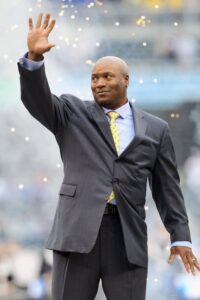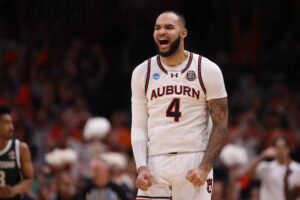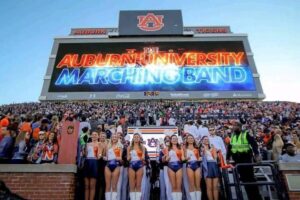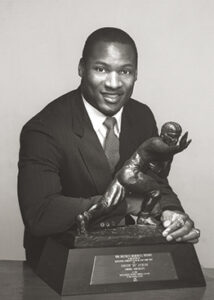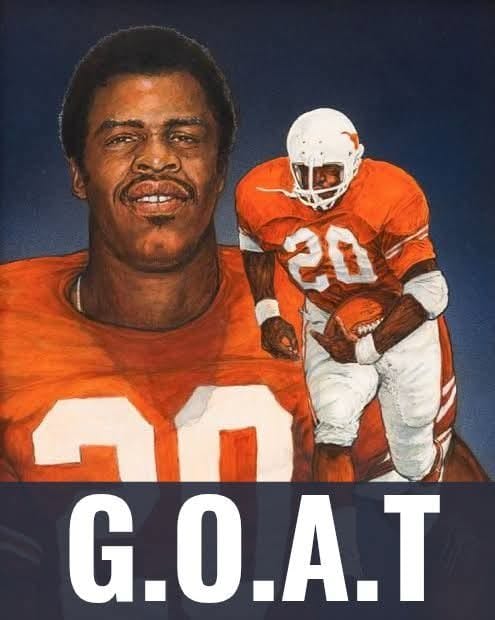
The Legend of the Texas Longhorns: Earl Campbell, College Football’s Greatest Player
Earl Campbell is an iconic name in college football, forever etched in history as one of the sport’s most powerful and dynamic players. In a competition to crown the greatest college football player of all time, Campbell outshone legendary figures like Herschel Walker of Georgia, Tim Tebow of Florida, and Archie Griffin of Ohio State. His victory in this prestigious contest was not simply a nod to his on-field success but an acknowledgment of the impact he had on the game, the players he played against, and the fans who idolized him. This essay explores the life, career, and legacy of Earl Campbell, highlighting his monumental contributions to college football and his rightful place in its history.
Earl Campbell was born on March 29, 1955, in Tyler, Texas, into a family of modest means. Raised in the heart of Texas, football was more than just a pastime; it was a way of life. Campbell’s affinity for the game began at an early age, playing on the dusty fields of East Texas, where his raw talent was evident from the outset. However, it wasn’t until his high school years at John Tyler High School in Tyler that he began to truly shine. As a senior, Campbell rushed for over 1,500 yards and led his team to a state championship, catching the attention of college scouts across the nation.
His exceptional high school career made him a coveted recruit, but it was the University of Texas that ultimately won out. The Longhorns had a proud football tradition, and Campbell’s arrival in Austin in the early 1970s would soon become the foundation of one of the most dominant eras in the history of college football. He was recruited by legendary head coach Darrell Royal, who had already established a reputation for producing top-tier running backs.
Earl Campbell’s time at the University of Texas was nothing short of spectacular. His college career was defined by a perfect mix of power, speed, and determination. When Campbell arrived in Austin, the Longhorns had already built a strong program, but his presence would elevate them to new heights. From the moment he stepped on the field, Campbell was a force to be reckoned with.
Campbell’s freshman year in 1974 was an impressive debut, but it was during his sophomore year in 1975 that he truly began to announce himself as a future star. He rushed for over 900 yards and scored nine touchdowns, demonstrating a rare combination of speed, agility, and power. His physicality was unmatched, and defenders often found themselves helpless in attempting to bring him down.
By his junior season in 1976, Campbell was not only a star for the Longhorns but was also being recognized as one of the best players in the country. He ran for 1,747 yards, which led the nation, and scored 19 touchdowns, helping Texas to an 11-1 record and a berth in the Cotton Bowl. His performance earned him the prestigious Heisman Trophy in 1977, solidifying his place in college football history.
The Heisman Trophy, awarded annually to the best college football player in the country, was Campbell’s crowning achievement. His win was a testament to his remarkable season and his unmatched ability to dominate opposing defenses. That year, he rushed for 1,744 yards, averaging over 6 yards per carry, and scored 19 touchdowns. He carried the Longhorns on his back, leading them to a 10-1-1 record and the number 2 ranking in the nation. His performance in the 1977 Cotton Bowl, where he ran for 145 yards and two touchdowns in a victory over Notre Dame, capped off one of the most impressive college football careers ever.
Campbell’s Heisman Trophy victory was historic. His dominance on the field had made him an unstoppable force, and it was clear that he was a once-in-a-generation talent. However, his success was not simply the result of athleticism alone. Campbell’s vision, his ability to read defenses, and his relentless drive to be the best set him apart from other players in his era.
In his Heisman acceptance speech, Campbell spoke about the sacrifices his family had made to help him achieve his dreams. His mother, who had worked tirelessly to support him, was in the audience, and Campbell dedicated his Heisman to her. It was a poignant moment, one that showcased his humility and the values that shaped him both as a person and as a player.
His victory in the Heisman Trophy race, however, was not without stiff competition. In the same year, Campbell faced off against other future legends, including Georgia’s Herschel Walker, Ohio State’s Archie Griffin, and Florida’s Tim Tebow. These players, all of whom are considered some of the best to ever play college football, challenged Campbell for the top honors. However, Campbell’s combination of raw power, incredible balance, and unstoppable force ultimately set him apart.
One of the most memorable matchups of Campbell’s career came against Herschel Walker, one of his biggest rivals and one of college football’s most celebrated running backs. Walker, who played for the University of Georgia, had a similar style to Campbell, combining power with speed. Throughout the late 1970s and early 1980s, Walker and Campbell were often compared, and their rivalry helped define an era of college football.
Walker, like Campbell, was known for his physical running style, but it was Campbell’s vision and elusiveness that often gave him the edge. The two never faced off in a head-to-head contest while in college, but their battles for the Heisman Trophy and national recognition were well-documented. Walker’s Heisman win in 1982 and Campbell’s 1977 victory often stirred debates among fans, analysts, and former players, each asserting that their guy was the best. Campbell, however, was generally seen as the more complete player. His ability to not only break tackles but also turn a short gain into a 50-yard sprint made him a weapon that opposing defenses struggled to contain.
Another name often mentioned in the conversation about the greatest college football player of all time is Tim Tebow. Tebow, who played quarterback for the University of Florida from 2006 to 2009, was known for his leadership, incredible athleticism, and uncanny ability to perform in clutch moments. His college career was highlighted by two national championships and a Heisman Trophy in 2007.
While Tebow’s versatility and leadership were impressive, many argue that Campbell’s impact as a running back was more profound. Tebow’s success was undoubtedly incredible, but Campbell’s ability to single-handedly carry a team with his running back prowess was unparalleled in his time. His power, quickness, and ability to score at any moment made him a dominant figure in college football, and while Tebow’s leadership made him a memorable player, Campbell’s raw talent as a rusher remains unmatched.
No discussion of college football’s greatest players would be complete without mentioning Archie Griffin, the only player in history to win the Heisman Trophy twice. Griffin’s career at Ohio State, which spanned from 1972 to 1975, was filled with remarkable achievements. He was known for his vision, speed, and ability to excel in big moments, and he remains one of the most accomplished players in the history of the sport.
Griffin’s two Heisman victories in 1974 and 1975 were a testament to his consistency and excellence. However, while Griffin was undoubtedly one of the best, Campbell’s ability to dominate the running game with such ferocity and consistency arguably gave him the edge in the conversation about the greatest college football player ever. Campbell’s incredible performances in bowl games, including his unforgettable run in the 1977 Cotton Bowl, left a lasting mark on the sport, further solidifying his place in history.
Earl Campbell’s legacy extends far beyond the college football field. His time at Texas was marked not only by individual accolades but by the championships, the broken records, and the unrelenting competitive spirit he brought to every game. His performances, many of which remain etched in the memories of Longhorns fans, helped elevate Texas football to national prominence.
Campbell’s professional career in the NFL, though impressive, did not reach the heights of his college years. He was drafted by the Houston Oilers with the first overall pick in the 1978 NFL Draft and went on to have a highly successful career in the league. Yet, it was his time at the University of Texas that defined his legacy as one of the all-time greats of the sport.
Even decades later, Campbell’s influence on college football can still be felt. His name continues to be synonymous with power running, and he serves as an inspiration to future generations of players. In 1990, Campbell was inducted into the College Football Hall of Fame, cementing his place as one of the sport’s true legends.
Earl Campbell’s victory over Herschel Walker, Tim Tebow, and Archie Griffin to be crowned the greatest college football player of all time is a well-deserved honor. His combination of power, speed, and determination made him a force to be reckoned with on the field. His Heisman Trophy, his unforgettable performances for the Texas Longhorns, and his lasting influence on the sport of college football all contribute to his legacy as one of the greatest players in the history of the game. For those who had the privilege of watching him play, Earl Campbell remains a symbol of greatness and an enduring legend of the college football world.

